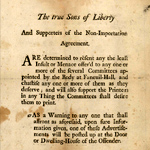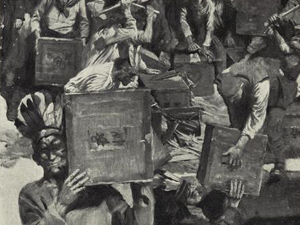The Boston Non-Importation Agreement:
Boston Takes Action Against the Townshend Revenue Act
The Boston Non-Importation Agreement of August 1, 1768, was a formal collective decision made by Boston based merchants and traders not to import or export items to Britain. The agreement, essentially a boycott, was a series of agreed upon commercial restrictions the colonists put in place with regard to trade with the mother country. The decision for the agreement came about as a way to protest and combat the 1767 Townshend Revenue Act. Under the Townshend Revenue Act, a tax had to be paid for the purchase of glass, lead, oil, paint, paper, and tea. The Boston Non-Importation Agreement was one of the most effective means of colonial resistance against British policy in the years before the American Revolution. A similar tactic was again employed in Boston and throughout the colonies five years later to protest the Tea Act with the boycott of British East India Company‘s tea that culminated with the Boston Tea Party.







